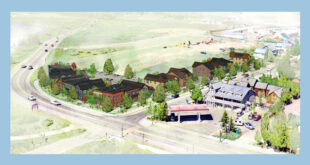Award is $225,000 for 10 Mutual Self-Help-Built homes
The county still has the chance to get a $225,000 grant from the U.S. Department of Agriculture Rural Development program to cover the administrative costs of a Mutual Self-Help Building (MSHB) Project, according to housing director KT Gazunis.
At a work session on Tuesday, April 14, Gazunis told the Gunnison Board of County Commissioners that USDA Rural Development program had agreed to an extension of the grant, which was first awarded to the county in June 2008.
In a letter, Rural Development told the Gunnison County Housing Authority that because their executive director’s position had been vacant for much of 2008 and due to Gazunis’ “ability to successfully develop housing with the Colorado Rural Development office in your previous position,” they would grant the extension.
Due to federal regulations that allow only a renewal of existing grants through this program, if the county chooses not to accept the grant, it would not be able to apply for the grant in the future.
The grant would allow for 10 homes to be either built in Gunnison County, or spread among Gunnison, Montrose and Delta counties. The maximum price for each of the homes would be $175,000.
In years past, there have been nearly 30 homes built in the county through this program.
“What we have to decide is if we want to accept this grant,” Gazunis told the commissioners. “If we do, then do we wish to build all 10 units in Gunnison County or do some here and some in adjacent authority region? Or do we want to do the entire project in an adjacent area?”
One scenario that was considered by Gazunis and the commissioners was to build six homes in Gunnison County, possibly in the Rock Creek Village subdivision in Gunnison, and allow Delta and Montrose counties to build the remaining four homes. “The hope is that if we are able to help them now, if they are then granted money in the future for a similar project, some of that money will come to us,” she said.
A MSHB makes homes affordable by enabling future homeowners to work on homes themselves. With this investment in the home, or “sweat equity,” each homeowner pays less for his or her home than if it were built by a contractor, according to Rural Development.
For any homes built in Gunnison County, the sweat equity would cover the down payment. Before people could start a home through this program, they would have to get home loan approval through Rural Development.
The preliminary home design that Gazunis presented to the commissioners is a 960-square-foot two-bedroom, one-bathroom house with an unfinished loft and a garage, either attached or detached.
Gazunis says, “We still don’t have a clear understanding if this house would have to be built in all of the other locations.”
The design has not been approved by the state architect’s office and may see some revisions before any construction can begin.
If the county accepts the grant, a home design can be finalized, an advertisement will be posted for homeowner applications and a Request for Qualifications (RFQ) will be sent to area contractors who might be willing to take on the project.
Gazunis says she has spoken to two MSHB homeowners about their experience.
“They said it was a nightmare at the time for those 18 months that they were building. But in retrospect they said they couldn’t be happier to be in those houses in this community. They said they got a phenomenal product and are very pleased to be there,” she says.
Buyers will have to meet certain income requirements to qualify for the MSHB program. When the grant was first applied for, the intent was to have homeowners be at 80 percent of the Area Median Income before they could apply.
When the grant was first awarded in 2008, the county had six potential homeowners apply for the program. Since so much time has lapsed, and five of the applicants could not be located, the application process is starting over.
To build the homes, a single construction supervisor would be hired for $55,500 to oversee all of the construction, which would happen in phases, one home after the other. Gazunis said the contractor would serve as an advisor to the homeowners, which would do most of the work and subcontracting themselves.
Commissioner Hap Channell asked Gazunis if she thought there would be enough interest from contractors to take on such a project.
“With the economy the way it is, I don’t think we will have any problem finding interested contractors,” she said. “We have contractors calling us every week asking if there are any projects being started.”
The earliest the MSHB projects could be started is 2010, but the commissioners need to accept or deny the grant by May 1, which they will vote on at their regular meeting Tuesday, April 21.
 The Crested Butte News Serving the Gunnison Valley since 1999
The Crested Butte News Serving the Gunnison Valley since 1999


